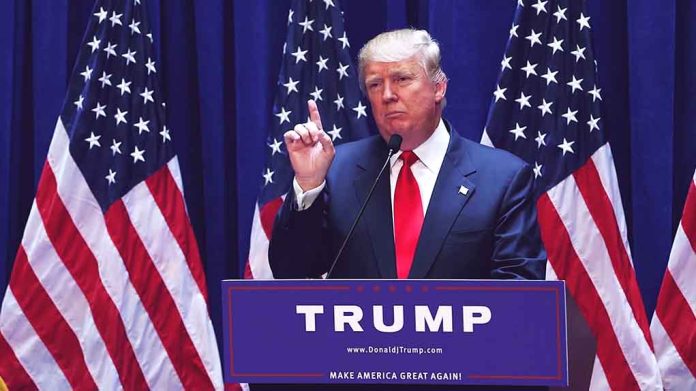
The legal fight over Trump’s buyout plan raises bigger questions about presidential powers and federal employee rights.
Key Takeaways
- A federal judge has blocked the Trump administration’s federal employee buyout program.
- Controversy surrounds the balance of presidential authority and employee rights.
- The unions argue the buyout plan is arbitrary and unlawful.
- About 65,000 federal workers have signed up for the plan.
Block on Trump’s Federal Employee Buyout
A federal judge in Boston has extended a block on the Trump administration’s deadline for its controversial federal employee buyout program, affecting over 2 million federal workers. The move, spearheaded by U.S. District Judge George O’Toole, ensures a temporary restraining order remains in place until further notice, pending future discussions on the legality and implementation of the program
The buyout initiative, managed by the Department of Government Efficiency under Elon Musk, aims to significantly trim the federal workforce and save trillions. However, this strategic plan has encountered notable resistance from labor unions, including the American Federation of Government Employees and AFL-CIO, which challenge its legality.
Legal Challenges and Responses
Lawyers representing the unions argue that the buyout plan violates multiple federal laws, labeling it arbitrary and capricious. Criticisms also surface regarding the funding of salaries, pension impacts, and other employee benefits under the proposal. The unions have pointed out that the Office of Personnel Management may have violated the Administrative Procedure Act by implementing the buyout without a lawful basis.
“To leverage employees into accepting the offer and resigning, the Fork Directive threatens employees with eventual job loss in the event that they refuse to resign,” the unions’ lawsuit said.
Amidst the legal battle, the Trump administration has extended the buyout program deadline, allowing negotiations and discussions to continue. Justice Department attorney Eric Hamilton described the buyout as a “humane off-ramp” for workers impacted by workplace policy changes.
Controversy Over the Buyout Plan
The plan’s opponents, including Democratic officials like Letitia James, question the administration’s ability to fulfill the buyout’s promises, pointing out perceived flaws and potential risks. Jonathan Turley, a constitutional lawyer, argues that the presidential buyout falls within Trump’s authority, expressing confusion over the court’s actions that hinder this executive decision.
“I think that Trump is on very solid ground with the buyout. I’m still a bit baffled by what the court is doing here. If the presidents are allowed to dictate conditions of employees coming into the office, what they’re working on, all of that is part of Article II powers of the president controlling the executive branch. I’m not, even today, certain what the constitutional problem is. You’ve got 65,000 employees who were told, look, we’ll let you stay at home and look for a job as long as you agree to resign and to give a number of months. They’ve agreed to it, the government’s agreed to it. That seems to me to be perfectly within the wheelhouse of the president. So I think he’s going to win on that,” said Turley.
The buyout plan allows employees to maintain pay until September 30 if they opt into the program, a point of contention for union leaders citing legal concerns about funding once appropriations expire in March.
Future Implications
This legal dispute underscores a fundamental debate on presidential power and federal employee rights. While some see the buyout as a necessary measure to streamline government operations, critics argue it threatens the integrity and effectiveness of public services. As the case progresses, its implications will resonate throughout the fabric of federal workforce management policies.
“President Trump’s so-called buyout offers are nothing more than the latest attack on federal workers and the services they provide,” New York attorney general James wrote in a statement.
The outcome could set critical precedent in defining the scope of executive discretion vis-à-vis the law, impacting future administrations’ approaches to federal workforce policies.


